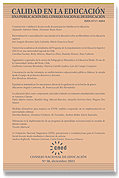Follow-up on Graduates of the Pedagogy in Mathematics in Secondary Education Program. The case of Universidad Católica del Norte, Chile
DOI:
https://doi.org/10.31619/caledu.n59.1278Keywords:
Mathematics Teachers, Graduates, Follow-up Studies, Feedback, Educational ImprovementAbstract
This article presents the results of a research study on the perceptions of graduates of the Mathematics in Secondary Education program regarding their career achievements, focusing on graduates from the Universidad Católica del Norte in Chile. The study aims to obtain relevant information that will facilitate the enhancement of initial teacher education and the development of ongoing updates in response to the ongoing challenges faced in training teachers in contexts characterized by uncertainty and constant change.
A mixed methodology is implemented, including a follow-up survey and a group interview. Quantitative data are analyzed using frequency statistics, while qualitative information is examined through content analysis and the establishment of both a priori and emerging categories.
The main findings are related to graduate's perception of achievement in the disciplinary dimensions and/or competencies, with a stronger emphasis on these aspects compared to the pedagogical ones. The areas that received lower ratings from the graduates correspond to abilities and competencies related to classroom management, and the generation of research, reflection, and problematization, about their own practice, as well as the educational phenomena associated with it.
Downloads
Published
Issue
Section
License
Copyright (c) 2023 Calidad en la Educación

This work is licensed under a Creative Commons Attribution 4.0 International License.
Authors retain their Copyright and only transfer a part of these to the journal, accepting the following conditions:
Authors keep their rights as authors and guarantee the right to the journal for the first publication of their work, which is simultaneously subject to the Creative Commons Attribution license allowing third parties to share the study accrediting the author and first publication in this journal.
Authors may adopt other non-exclusive license agreements for distribution of the version of the published work (e.g. inclusion in an institutional thematic file or publication in a monographic volume) accrediting initial publication in this journal.
Authors are allowed and recommended to share their work over the Internet (e.g. in institutional telematic files or their website) before and during the submission process, which may lead to interesting exchanges and increased citation of the published work. (See The effect of open access).

